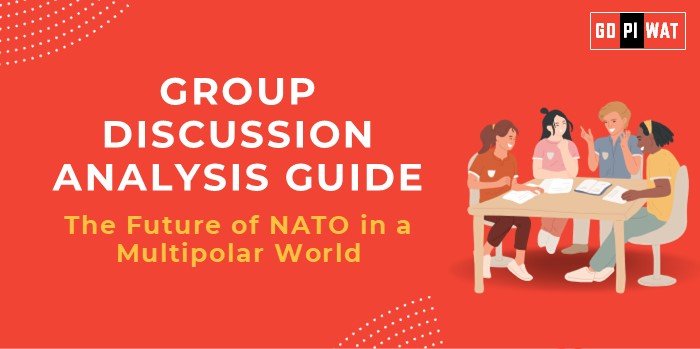📋 Group Discussion (GD) Analysis Guide: The Future of NATO in a Multipolar World
🌐 Introduction to the Topic
Opening Context
In a rapidly shifting global landscape, NATO, a relic of the Cold War era, is facing challenges that question its relevance in an increasingly multipolar world. Rising powers like China, resurgent Russia, and growing regional alliances compel NATO to redefine its role and strategies.
Topic Background
Formed in 1949, NATO was primarily a response to Soviet expansionism. While it thrived during the Cold War, the post-1991 unipolar moment led to its transformation into a collective security organization with roles in global peacekeeping and counterterrorism. However, emerging power dynamics now test its cohesion and mission.
📊 Quick Facts and Key Statistics
- 🌍 Members: 31 countries (Sweden pending accession).
- 💰 Military Spending: NATO accounts for 56% of global defense expenditure (2023).
- 👨✈️ Global Troop Deployments: 10,000+ troops in Eastern Europe as part of deterrence strategies.
- 🇨🇳 China’s Influence: By 2022, NATO formally recognized China as a “systemic challenge” in its Strategic Concept.
- 🇷🇺 Russia’s Military Spending: $86 billion (2023), a 20% increase post-Ukraine war sanctions.
👥 Stakeholders and Their Roles
- 🌍 NATO Members: Ensure collective defense and strategic coherence.
- 🇷🇺🇨🇳 Russia and China: Challenge NATO through military assertiveness and alternative global forums.
- 🇪🇺 EU Allies: Balance NATO’s influence with independent EU security ambitions.
- 🌏 Global South: Emerging powers like India and Brazil question NATO’s relevance in their regions.
🏆 Achievements and ⚠️ Challenges
Achievements
- 🛡️ Unified Response to Russia: NATO’s swift response to the Ukraine crisis solidified its defense posture.
- 🌍 Global Peace Missions: Active engagement in Kosovo, Afghanistan, and anti-piracy operations.
- 💻 Technological Innovation: Investments in cyber defense and emerging technologies to counter hybrid threats.
Challenges
- ⚔️ Internal Divisions: Disputes over burden-sharing and policy direction, e.g., Turkey’s differing priorities.
- 💻 Evolving Threats: Cybersecurity, misinformation, and space-based challenges.
- 🌐 Competition with Other Alliances: BRICS, Shanghai Cooperation Organization (SCO).
📖 Global Comparisons
- 🇪🇺 EU’s PESCO Initiative: Aims to reduce reliance on NATO by strengthening Europe’s defense autonomy.
- 🇨🇳 China’s BRI Strategy: Expanding influence in NATO-adjacent regions like Eastern Europe.
🔍 Case Studies
- 🛡️ NATO’s Baltic Air Policing initiative: A deterrence measure against Russian incursions.
- 📑 Strategic Adaptation: The 2022 Madrid Summit’s new Strategic Concept.
💡 Structured Arguments for Discussion
Supporting Stance
“NATO’s relevance persists as a bulwark of collective security and democratic values in an uncertain world.”
Opposing Stance
“The multipolar world diminishes NATO’s dominance, requiring a shift towards regional alliances and cooperation.”
Balanced Perspective
“While NATO adapts to emerging threats, its relevance depends on evolving from a transatlantic to a truly global security framework.”
🛠️ Effective Discussion Approaches
- 📢 Opening Approaches:
- “NATO’s response to Russia’s aggression highlights its enduring role in European security.”
- “The rise of China and regional alliances presents unprecedented challenges for NATO.”
- 🔄 Counter-Argument Handling:
- “NATO’s cohesion is weakening, but its adaptability is evident in its focus on cybersecurity and partnerships beyond Europe.”
- “While China is rising, NATO remains unmatched in collective defense capabilities.”
📊 Strategic Analysis of Strengths and Weaknesses
- 💪 Strengths: Collective defense framework, technological superiority.
- 💔 Weaknesses: Overreliance on the U.S., internal discord.
- 🌍 Opportunities: Expansion to Asia-Pacific partnerships.
- ⚠️ Threats: Rival blocs like BRICS and SCO.
📚 Connecting with B-School Applications
- 💼 Real-World Applications: Strategic management and leadership lessons from NATO’s evolution.
- 🎓 Sample Interview Questions:
- “How can NATO remain relevant in a world where alliances like BRICS are growing?”
- “What role does innovation play in NATO’s modern security strategy?”
- 💡 Insights for B-School Students:
- Importance of adaptability in legacy organizations.
- Collaborative leadership in multinational settings.


